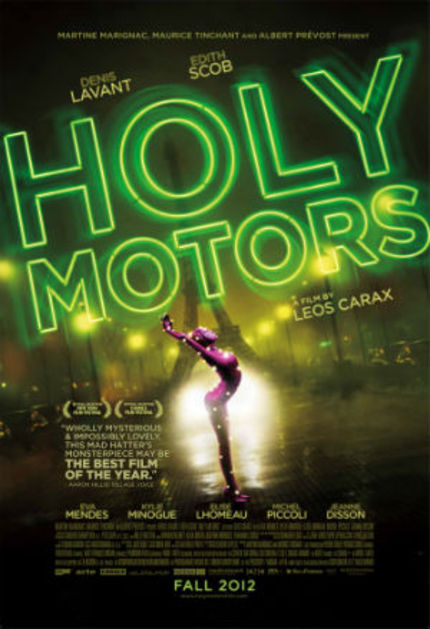Opening: HOLY MOTORS Rattles Cages and Delights the Senses

My top pick of the year (so far), Leos Carax's Holy Motors is a dazzling carousel of emotions, ricocheting from earnest entreaty to ridiculous physical humor to poignant tenderness to revealing intimacy to the silly and absurd. Really, it touches on the full range of human experience, and features an absolutely sublime performance by Denis Levant, who plays a host of characters throughout the course of a single day.
The film debuted at Cannes earlier this year, where our own Brian Clark grappled with it:
With so many serious, dramatic and even generic (see Lawless) films in competition at Cannes, director Leos Carax's Holy Motors came as something like a 100 mph gust of fresh air. In fact, this sci-fi/comedy/I-don't-know-what-to-call-it is such a wild, weird and joyful film that I wouldn't have been surprised if fireworks started going off in the theater 3/4 of the way into the film. It's that kind of experience.
After recapping Carax's career to date, Brian continues:
Monsieur Oscar (played by longtime Carax collaborator/alter-ego Denis Lavant) [is] a mysterious character who rides around Paris in a limousine from dawn to midnight, disembarking in intervals for different "appointments." These appointments, which he and his driver discuss as if they were banal meetings, involve Lavant literally becoming somebody else and carrying out some sort of action or performance. As usual, Lavant is versatile, physical and hilarious, and Carax expertly exploits these qualities. Oscar becomes, among other things, a hired killer, a business man, the character he played in Merde and a father. If this doesn't make total sense, don't worry about it. Holy Motors is an absurd film through and through, and if you get bogged down with reductive questions like "What is it about?" and "What does it mean?" you're not going to have any fun.
And the film really is a lot of fun. Carax directs with his gusto and spontaneity cranked to 11 -- imagine an entire movie in the same spirit as the much-loved David Bowie dance scene in Mauvais Sang and you're part of the way there. The film also calls to mind some of Luis Buñuel's later work, but those films don't feel anywhere near as spontaneous. In addition to the style and energy, the film also deals in images that, to my knowledge, have not been put on screen before. If you don't feel an exhilarating gust of excitement during the sex scene in a motion capture room or and the impromptu accordion jam in what looks like Saint-Eustache church, you may want to check your pulse. While viewers used to mainstream, plot-driven films may be a bit baffled by the movie as a whole, it's hard to imagine anyone not having a good time.
All that said, the film is not merely a collage of what-the-fuck moments and inspired craziness. There is also a sense of sadness, wonder and angst lurking moment to moment beneath the surface of Carax's reckless joy, and while I feel like analyzing the film in any objective sense is missing the point, I will say that Holy Motors made me reflect deeply on modern life, performance, technology, regret, death, love and cinema itself... occasionally all at the same time.
Holy Motors comes with my highest recommendation. I'm grateful to have seen it in appreciative company at Fantastic Fest recently, and hope that you have the opportunity to experience it in a theater.
The film opens today in New York -- check the official site for theaters -- and will roll out in the coming weeks in limited release across the U.S.
Brian Clark
contributed to this story.







